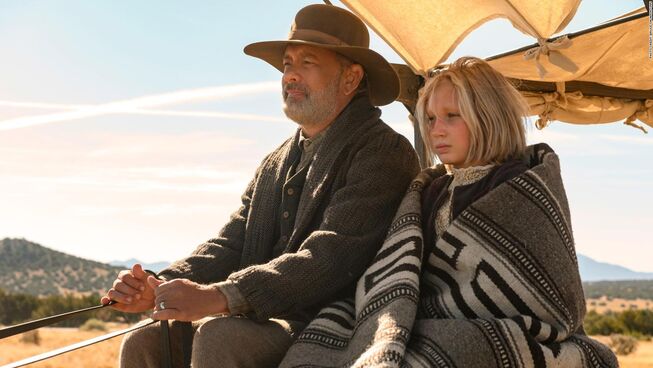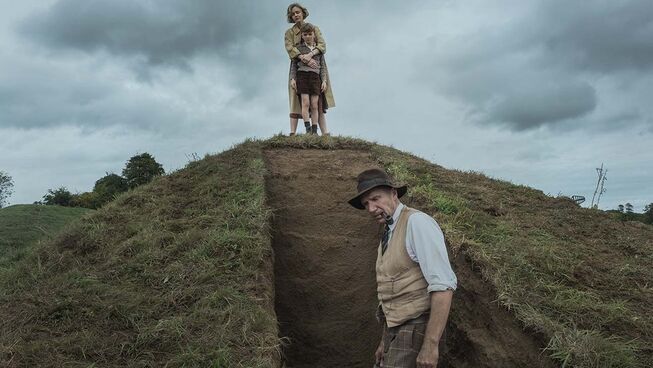
4 out of 5 stars
In this overly plugged-in and information-laden society, it may be difficult to imagine a time when the news was not immediately accessible. Novelist Paulette Jiles manages to take audiences back to the era when newspapers were a novelty. Most people would need the information read to them due to their illiteracy. News of the World follows former newsman and Civil War soldier, Captain Jefferson Kyle Kidd (Tom Hanks). The man who makes his way in the world by reading the news to the US frontier's settlers.
At ten cents a person, Captain Kidd comes into small communities and shares what is happening in the vast world outside Texas's wilds after the Civil War. As he makes his way along the backroads of both the free and savage civilization's edge, the soldier comes upon a recently damaged wagon. Captain discovers a lynched black man hanging in a tree by the road and a 12-year-old girl who does not speak English. While he assesses the situation, a small group of Union soldiers come upon the wreckage and direct the captain to take the girl to the next township to hand her over to the local authorities.
As the two head up the sun-baked road, he manages to piece together her story. Johanna (Helena Zengel) had come to the frontier with her German family. She had been taken captive by a tribe of Native Americans as a small child. And most recently she had been taken from the Indian community and was being transported by the Bureau of Indian Affairs to the remaining family who lived hundreds of miles into the Texan interior. Reluctantly, Captain Kidd was left to care for the young girl who struggled to communicate and assimilate to the white man's world. Their journey is laden with multiple obstacles and challenges that manage to build a bond between this unsuspecting pair. This relationship develops into one that makes them realise they need one another to survive until the next day.
Few actors could make the reading of the news in 1870 compelling, but Tom Hanks fits into this role with relative ease. Through his natural abilities to turn a phrase and draw audiences into the story, he is the right choice to portray the retired soldier. With his Captain Phillips collaborator Paul Greengrass behind the camera, they can bring this transitory time in US history to life. Hanks’ mastery of understatement takes the everyman role to a whole new depth of character needed to soothe the souls of those he is speaking to in the film and in the cinema. A performance complemented by Greengrass’ beautiful portrayal of the vast lands of Southwest America while maintaining the tensions of the savage landscape.
Yet, the performance that needs to be celebrated is that of the young talent, German actress Helena Zengel. Even though she does not speak much English throughout the movie, this young actress manages to hold her own with the multi-Academy Award-winning actor. Her character is allowed to mature before the audience. She is given the freedom to become an essential part of this story. Since the majority of the film involves these two actors, they prove to be a winning combination that will keep people wanting to know how things turn out in the end. A confronting and compelling look into human history proves that the simplest of concepts can be both profound and worth engaging within cinemas.
Reel Dialogue: Why do we have to suffer?
As each wave of difficulties wash across you while watching this film, it is evident that suffering is a pervading theme. Even with all of Captain Kidd’s good intentions, this story shows that hard times will still come.
It might be a surprise to many, but Christianity is the only worldview which has an actual answer to the problem of evil and suffering. Christians can attest to the fact that they serve a God who lived as a man on this earth and experienced temptation, torture, hunger, thirst, hatred and death. Due to the work of Jesus on the cross, the justice of God is manifested in his son. The cross is a means of symbolising how much God cares about humanities suffering. A more profound conclusion is that we may never know the specific reason for our suffering, but that we can identify the God who understands the rationale behind the pain.
“If only there were someone to arbitrate between us, to lay his hand upon us both, someone to remove God’s rod from me, so that his terror would frighten me no more. Then I would speak up without fear of him, but as it now stands with me, I cannot” - Job 9:33







